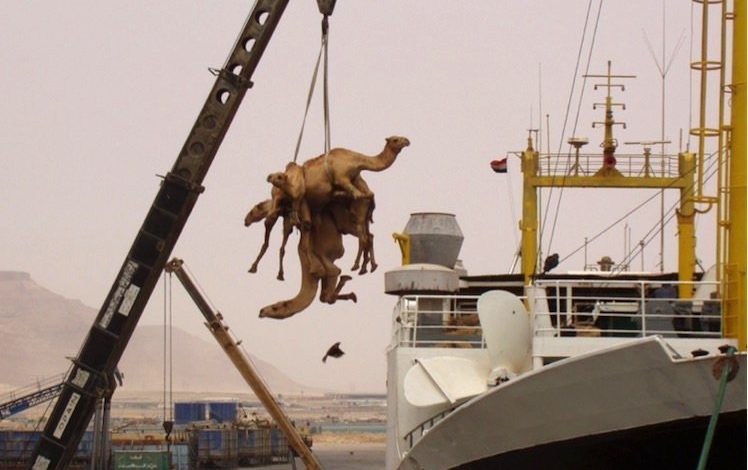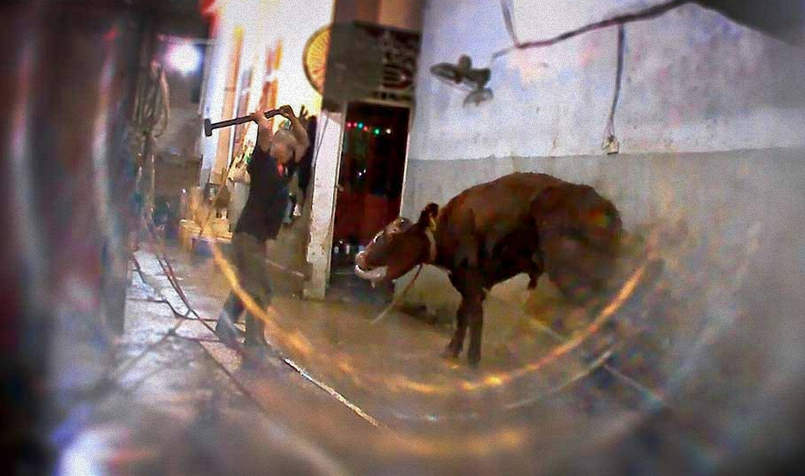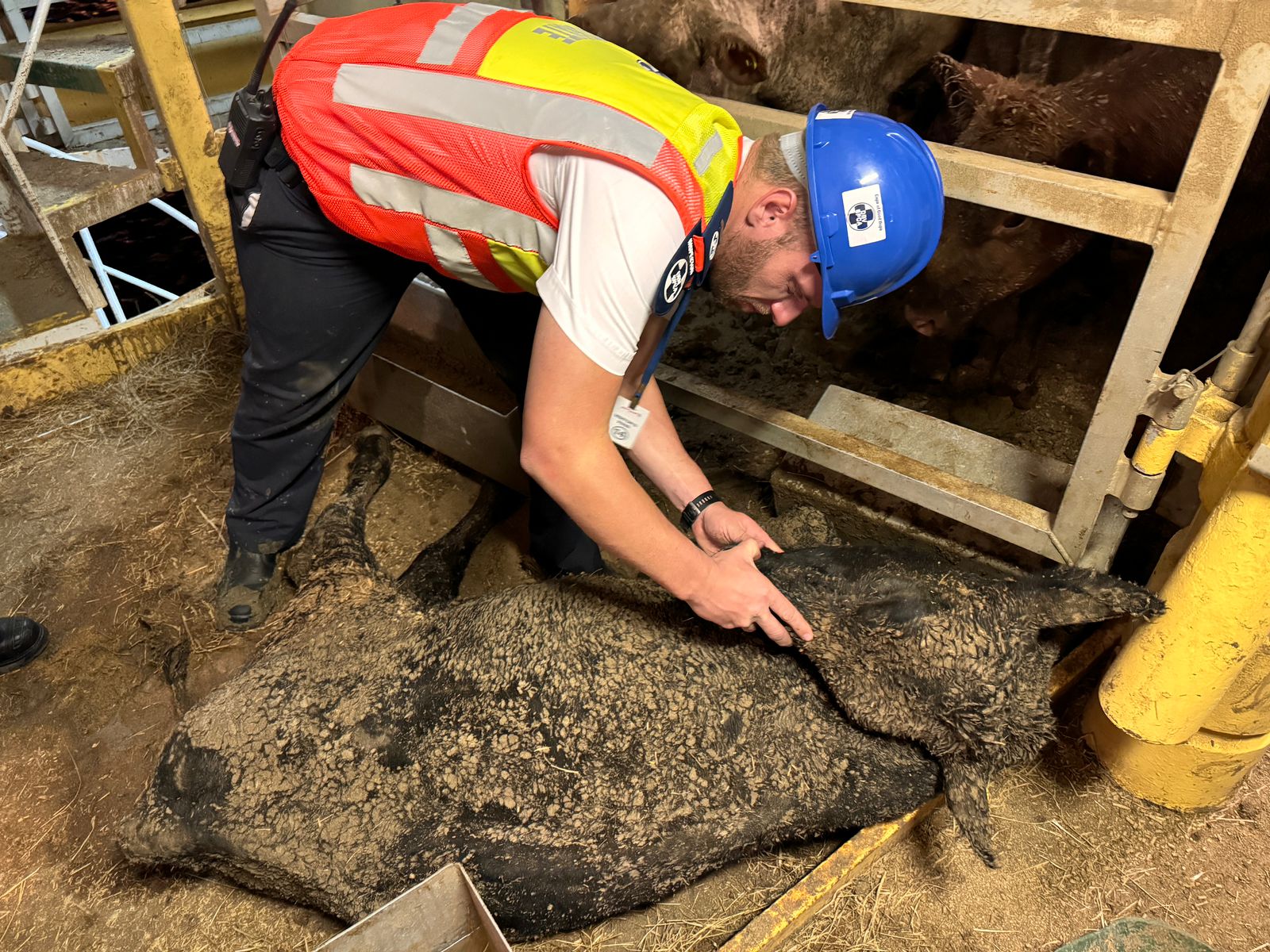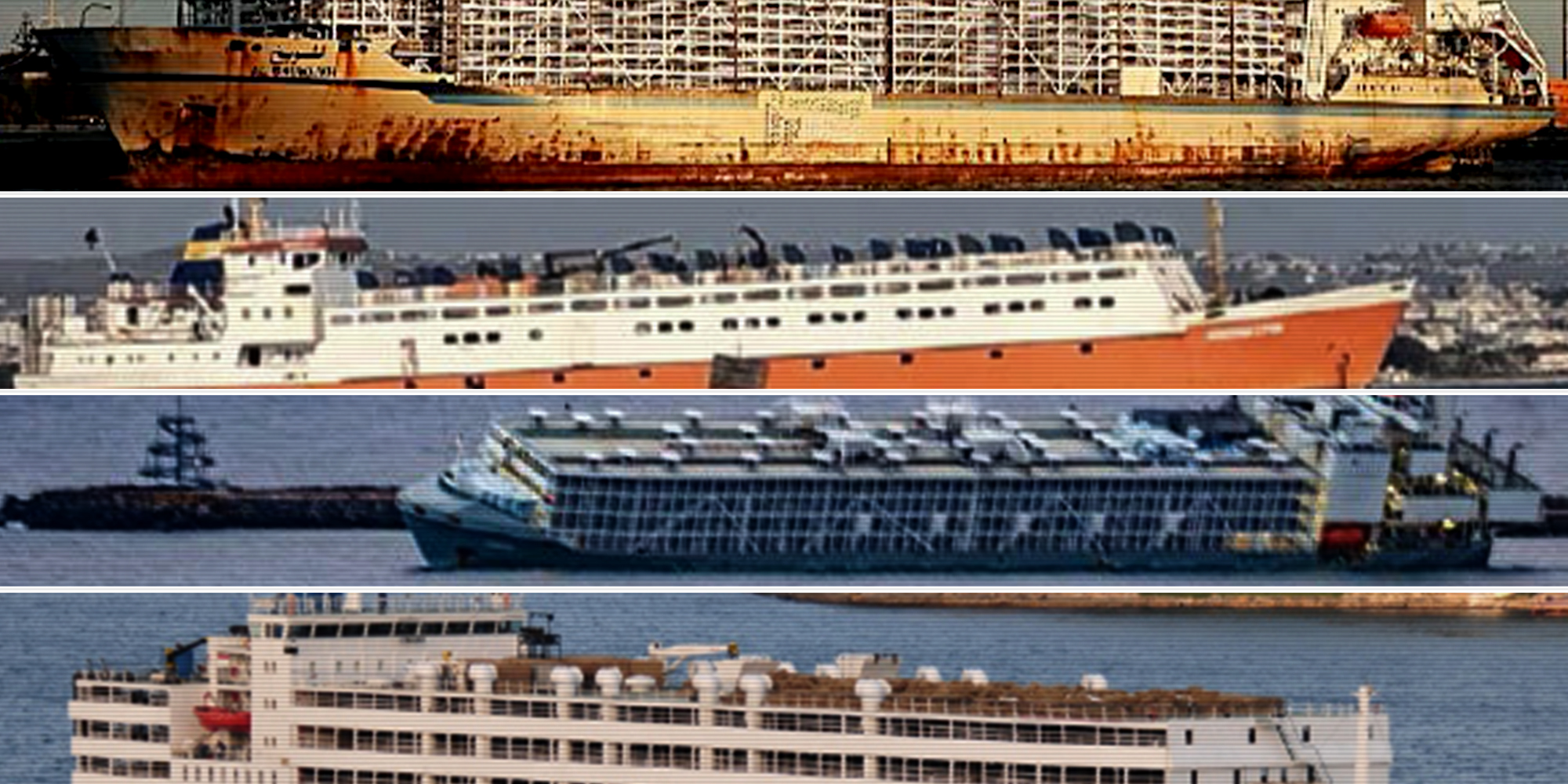To be a vet on a long-distance, animal-translocation ship is harrowing and brave. You’re there for the animals, but you’re witnessing the worst treatment humans can inflict on them.
Dr Lynn Simpson was appointed by the Australian government to accompany shipments to their destination. When her reports became too graphic for even the officials who appointed her, she fell foul of the agricultural department that permitted the shipments and she was fired.
Much of what we know about these translocations comes from the blog site she set up in response – and it’s harrowing.
 Camels being offloaded in Egypt. (Photo: Lynn Simpson).
Camels being offloaded in Egypt. (Photo: Lynn Simpson).
“The ship was shrouded in a cloak of stench,” she writes. “There was no escaping it and it was recycled through the vessel via air conditioning in the accommodation and equally re-circulated back into the livestock holds.
“Dead animals [were] lifted into a wheelbarrow and pushed up or down a ramp to the few exit points. If the animal was decomposing rapidly they would be delicate to move without making them fall apart or explode, degassing internal build-up.
“The men on this voyage utilised empty chaff bags to fill with bits of body and then shovels to fill the barrows with fluid discharge and abdominal contents. The bags would seep with body fluids and be reused until worn out.”
A fellow vet who was on one of these ships told her: “It was like trudging through a disgusting soup of decomposing body parts. It was difficult to get the bodies out as they fell apart in your hands.”
Animal translocation is a multibillion-dollar industry and the world’s seas are awash with farm animals heading for slaughter.
 An animal in a slaughterhouse in Vietnam after being unloaded from a live export ship. (Photo: Animals Australia)
An animal in a slaughterhouse in Vietnam after being unloaded from a live export ship. (Photo: Animals Australia)
An estimate by The Guardian is that the number is nearly two billion animals a year.
Large numbers are destined for the Middle East, which is where the Al Kuwait, the foul-smelling ship that docked in Cape Town, was headed with 19,000 cattle on board.
Call for a ban
The animal welfare organisation Four Paws, which has been documenting this trade for many years, has called for a ban on animal transport by sea.
In 2021 it petitioned the South African Department of Agriculture, Land Reform and Rural Development to support a ban, saying animal welfare cannot be assured on the high seas. It didn’t happen.
The South African NSPCA, which inspected the Al Kuwait and had to euthanise severely hurt animals, added its voice to a ban on sea transshipments.
It said the incident “serves as a stark reminder that the live export of animals by sea is a gruesome and outdated practice that inflicts unnecessary suffering on sentient beings. It underscores the urgent need for legislative reform and heightened global awareness to end this cruelty once and for all.
“This method of trade causes pain, suffering and distress to many animals, including high mortality rates occurring during the voyage. No country possesses the capacity or competence to ensure or guarantee adequate animal welfare standards aboard livestock vessels.”
A reason given for the need to ship live animals to mainly Muslim countries is that they need to be slaughtered there according to Halaal laws.
The cruelty of delivering those animals, however, violates Islamic law which requires that animals for consumption must be treated with kindness and respect throughout their lives, be well-fed, healthy and free from disease or injury.
Halaal emphasises compassion, respect for life and adherence to religious principles throughout the process.
The director of South Africa’s Muslim Judicial Council Halaal Trust, Shaykh Achmat Sedick, has in the past spoken out against the live export, questioning how the government could permit the shipping of tens of thousands of animals to the Middle East.
He said these animals would not have had “tay-yib”, which means wholesome and humane treatment.
Live export is not necessary.
Animals could be slaughtered according to halaal principles in the country of origin and shipped as frozen carcasses. This method of delivery is, in fact, increasing. In 2019 Australia exported 57 million kilograms of frozen lamb to the Middle East. There is no excuse for live delivery.
 Cattle are inspected by the SPCA in the Al Kuwait carrier, docked at Cape Town harbour on Monday, 19 February 2024. (Photo: NSPCA)
Cattle are inspected by the SPCA in the Al Kuwait carrier, docked at Cape Town harbour on Monday, 19 February 2024. (Photo: NSPCA)
History of cruelty
These translocations have a grim history. Kuwait Livestock Transport & Trading Company, which owns Al Kuwait (one of the biggest animal carriers in the world), has been accused of providing substandard conditions for livestock – including overcrowding, poor ventilation and insufficient access to food and water – high mortality rates, mishandling of animals and lack of transparency.
As ships go, the Al Kuwait is one of the better such vessels, specifically built for the job. Most are old car carriers or other former cargo ships – floating feedlots rather than purpose-built vessels.
According to a recent report by the European Commission, 54% of the vessels in use for animal transfers are considered high to very high maritime safety risk and do not comply with EU animal welfare legislation.
It found that their interior fittings were unsuitable for live animals, resulting in them often injuring themselves, and many vessels were inadequately ventilated.
“The ammonia levels on cattle transports are also so high they cause eye irritation and sometimes blindness.”
A spokesperson for Wellard, one of the world’s largest livestock exporters, claimed the biggest threat to the global live export industry was old ships. “They have inferior standards and livestock services and are more prone to accidents and breakdowns.”
More than half of the 129 livestock carriers listed as active were built before the 1980s.
According to Adam Kent, managing director of market analysts Maritime Strategies International, the livestock carrier fleet is one of the oldest sectors in the global trading fleet, with an average vessel age of 38 years. In comparison, the average age of a container ship is 13.
“Most ships were converted from general cargo or ‘roll on roll off’ (RoRo) vessels, meaning ships that have been designed to carry wheeled cargo.”
 Animal carrier plan. (Image: Foxitsoftware)
Animal carrier plan. (Image: Foxitsoftware)
 Profile of animal transporter. (Image: Foxitsoftware)
Profile of animal transporter. (Image: Foxitsoftware)
Paul Pistorius, managing director of Livestock Express, a seaborne livestock carrier with purpose-built vessels, warned that converting old vessels into livestock carriers means making compromises.
“When converting a vessel, you must live with the original hull and machinery and you always need to make compromises during the conversion phase. History has shown that these compromises may lead to poor animal welfare outcomes. Unfortunately, many of these vessels don’t always meet the standards to which we believe livestock carriers should adhere.”
A large number of livestock-carrying ships are also sailing under flags of convenience with poor reputations for ship safety.
Out of the 129 livestock-carrying ships listed as active by the global port inspection body, the Paris MOU, 52 were flying flags from countries currently blacklisted.
In addition, 10 of the companies that own or manage converted vessels built before 1975 were listed as “low or very low-performing” by the European Maritime Shipping Agency.
The results are often tragic.
In 2015, Jordan rejected a shipment of 13,000 sheep from Romania because 40% of the animals were dead. A veterinary inspection at the port found a failure to provide adequate food or water on the eight-day trip.
In 2017, about 2,400 sheep died from heat stress on a ship sent from Australia to the Middle East.
In 2019, the Queen Hind, a 40-year-old vessel owned by Romanian company MGM Marine, was carrying more than 14,000 sheep when it capsized en route from Romania. The 22 crew members were rescued, but just 180 sheep survived.
In spring 2021, when the Suez Canal was blocked, 2,600 cattle were killed after being stranded at sea for over three months on the vessels Elbeik and Karim Allah.
Simpson says these problems exist on all long-distance animal carriers, not just the old ones.
She’s witnessed cattle forced to stand on hard floors for weeks on end; sick, injured animals left to die, and sheep literally cooking from the inside with their “fat melted and like a translucent jelly.
“Some animals are held on decks for as long as 40 days, living on hard decking of concrete and metal. They are not built to cope with these environments,” said Simpson.
She points out that the long time spent at sea makes it even more critical for ships to be well-adapted for animals to protect their health and welfare.”
Are there solutions?
The NGO Compassion in World Farming identified 10 frequently recurring issues with animal shipping with very serious impacts on animal welfare:
- Journey logs incomplete and with an unrealistically short estimated journey time.
- Failure to provide animals with adequate food, water and rest.
- Inadequate water supply.
- Inadequate bedding.
- Insufficient headroom.
- High temperature and inadequate ventilation.
- Transport of unfit animals.
- Unweaned lambs and calves.
- Inadequate partitions in the vessel.
Four Paws said the only solution was to:
- Ban live animal transports to third countries.
- Ban animal transport by sea.
- Ban long-distance transport with a duration of more than eight hours (four hours for poultry).
- Ban transport of unweaned animals.
- Animals must be slaughtered at the nearest suitable slaughterhouse.
- No approvals of animal transport when temperatures are lower than 5°C or greater than 25°C.
- Strengthening controls on live animal transport to ensure better enforcement.
- More sanctions in case of infringements.
- Transport of meat instead of live animals.
As you read this, the Al Kuwait is heading further into the tropics on its way to Iraq – with temperatures rising. DM
https://www.youtube.com/watch?v=REeWvTRUpMk




 Profile of animal transporter. (Image: Foxitsoftware)
Profile of animal transporter. (Image: Foxitsoftware) 